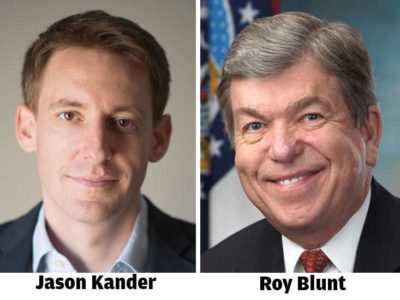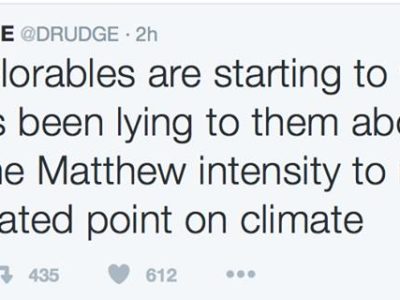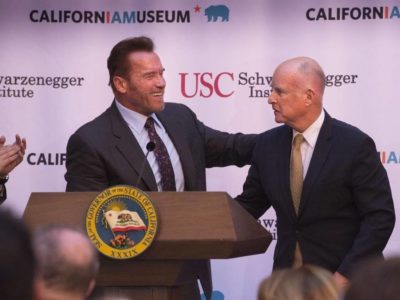Global Climate Cabal Revealed!!
Now it can told! Exclusive interview with cabal leader.
My eyes were opened at last.Last week, one Presidential candidate accused the other of meeting “in secret with international banks to plot the destruction of U.S. sovereignty in order to enrich these global financial powers.” The candidate also spoke of a global conspiracy of multinational corporations and media. Inspired by this speech, I was able to contact a member of this international cabal in their secret headquarters in Zurich. It turns out you just dia...
CONTINUE READINGBattle for the Senate: Missouri
The Missouri Senate seat is unexpectedly in play.
Missouri, the “Show Me” state, wasn’t on my original list of states with close Senate races. But the race has tightened since then, rather surprisingly. It pits incumbent Republican Roy Blunt against Jason Kander, an Afghanistan War veteran who is currently Secretary of State. Kander doesn’t have much of a track record on environmental issues. His website he endorses renewable energy and bemoans a rollback of the state’s renewable portfolio standard. He also...
CONTINUE READINGHope in Kigali
How one step could avoid 0.5°C of warming
Today, with what could be very little fanfare, the world may take one of its largest steps yet to avoid the worst impacts of climate change, all by phasing out a little-discussed chemical used in refrigeration and air conditioning - hydroflourocarbons. Hydrofluorocarbons, or HFCs, are considered a "short-lived climate pollutant" or "super climate pollutant," a category of pollutants that do not stay in the atmosphere nearly as long as CO2, but that have many times CO...
CONTINUE READINGCalifornia’s Zero-Emission Vehicle Mandate In Need Of Reform
Long-term climate goals depend on addressing the current "glut" of compliance credits
California leads the nation in plug-in electric vehicle sales, with about 40% of the nationwide total happening in the Golden State. While some of that progress is related to the sheer market size here, much of it is due to state policies. And the biggest of those policies is the "zero emission vehicle" (or "ZEV") mandate, which the California Air Resources Board first adopted by regulation in 1990 under its Clean Air Act authority. The program has been modified over ...
CONTINUE READINGBattle for the Senate: Florida
Failed presidential candidate Mark Rubio fights to keep his Senate seat in the Everglade State.
Anyone over 30 probably remembers Florida's role in the 2000 election, when a few hundred votes (and five Supreme Court Justices) swung the election to Bush. Florida remains a swing state today. This race will be closely watched for that reason, as well as the strong contrasts between the candidates' policy views. Compared to most Senators, Mark Rubio has an unusually high national profile, beginning with his surprise path to his Senate seat against more experienc...
CONTINUE READINGBattle for the Senate: Illinois
This race features an environmentally leaning Republican versus a Democratic war hero.
Mark Kirk is an outlier among his fellow GOP Senators. His lifetime score from the League of Conservation voters is 57% -- compare that with many republicans who are at 3% or lower. His opponent, Tammy Duckworth, is a war hero with a lifetime score of 85%, still comfortably above Kirk's. So there's a difference on environmental issues, though less extreme than in many other Senate races. Kirk was born in Champaign, Illinois -- U of I country (Go Illini!) - and g...
CONTINUE READINGA Stark Contrast: Clinton v. Trump on Climate Policy
Clinton wants to cut carbon emissions, Trump wants to raise them.
Forty percent of millennials don't see a difference between Clinton and Trump on environment, energy, or climate policy. That's just wrong -- so wrong that it's hard to believe anyone is that misinformed. The candidates are as different as day and night on those issues. As Paul Krugman said on Friday, "there is a huge, incredibly consequential divide on climate policy." Trump's enthusiasm for fossil fuels, and his opposition to climate policy, aren't just a matt...
CONTINUE READINGBattle for the Senate: Indiana
The Indiana race pitts an anti-regulatory incumbent against a pro-environmental challenger.
Indiana presents another strong contrast in environmental views. The Republican, Todd Young, has a rating of 3% from the League of Conservation voters. His opponent, Evan Bayh, has a 74% rating. Young is an Annapolis graduate and former Marine officer, who earned his MBA from night classes at the University of Chicago. After a short stint at the Heritage Foundation, he worked as a management consultant while taking more classes at night and getting a law degree ...
CONTINUE READINGCelebrating California’s Climate Change Leadership
State Government Leaders From Both Parties Celebrate AB 32's Tenth Anniversary
In stark contrast to a dysfunctional national government and an utterly dispiriting presidential campaign, Sacramento, California was today the site of an inspirational, bipartisan celebration. Current California Governor Jerry Brown, a Democrat, and his predecessor, Republican Governor Arnold Schwarzenegger, joined past and present state legislative leaders to commemorate the 10th anniversary of California's landmark Global Warming Solutions Act of 2006, b...
CONTINUE READING










